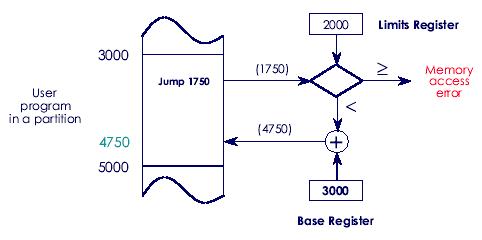
Quiz 5, Q&A
Q. What is relocation?
A. When a program is linked, the linker must know at what address the program will begin in the memory. Suppose that the first instruction is a call to a procedure at absolute address 100 within the binary file produced by the linker. If this program is loaded, that instruction will jump to to absolute address 100, which may be inside the operating system. This problem is known as the relocation problem possible solution is is to modify the instructions as the program loaded into memory.
Q What is protection?
A. Relocation during loading does not solve the protection problem. A solution to both the relocation and protection problems is to equip the machine with two special hardware registers, called the base and limits registers

Q. What is internal fragmentation?
A. Waste of memory within a partition, caused by the difference between the size of a partition and the process loaded. Severe in static partitioning schemes (Multiprogramming with Fixed Partitions (MFT)).
Q. What is external fragmentation?
A. Waste of memory between partitions, caused by scattered noncontiguous free space. Severe in dynamic partitioning schemes (Multiprogramming with Variable Partitions (MVT), swapping).